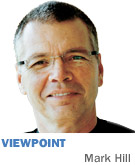Subscriber Benefit
As a subscriber you can listen to articles at work, in the car, or while you work out. Subscribe Now
 The explosion in innovation in technology has put us in a position where we should explore a totally new way to look at mass transportation in central Indiana.
The explosion in innovation in technology has put us in a position where we should explore a totally new way to look at mass transportation in central Indiana.
I am not suggesting the answer, but rather am inviting us to explore new available options. Without this exploration, we might well commit billions of dollars over many years in an effort that will continue to produce the results we have seen in a city that does not have the density to afford traditional mass transit solutions.
There is little doubt that an efficient system of moving people around our city can have a dramatic impact, but I would like to focus on two issues.
First, an efficient mass transit system is an attack on poverty. Allowing those without the means to own a car to get to work at any point in the city, in a reasonable amount of time, will make a big difference both to those working and to the companies where they work. Disparity of income is the problem of our generation and this directly attacks that issue.
Second, it will attract talented young people to our city. We are competing for talent with other cities. For the millennials we are trying to attract, there is a shift going on in the way they think about the places they prefer to live. They want an urban lifestyle and they want to get around without a car. Their presence in our city presents a significant revenue opportunity in our tax base.
What is different now?
• The ubiquity of smartphones. That phone in your pocket has the power of a mainframe that filled a room and cost $4 million in the 1970s. More important, most people, regardless of means, have access to a smartphone.
• Access to the network. Smartphones today have reliable and fast access to the Internet. Just in the last five years, the speed and reliability of the network have improved by an order of magnitude, and despite the daily glitches we still see, they are getting better all the time.
• Availability of massive cloud computing. Amazon Web Services has revolutionized the way we can build and distribute massive applications at a fraction of the cost of building out a data center. Access to this kind of inexpensive computing power offers us the opportunity to build new applications that can enhance our lives. Netflix is a great example of a massive consumer service that would not be possible without it.
• Ideas. Uber and Lyft have given us a new way to think about transportation. The reason these companies have such lofty valuations is not because they are displacing taxis. It is because they have the potential to disrupt transportation. We should take note of these ideas and project where they might take the city of Indianapolis. We should extend these ideas to think about making Indianapolis great.
Where to go now?
First, I suggest you imagine a city where, much like the Uber app, you can request a ride from one point to another, anywhere in the region. Rather than a single driver, the massive cloud computing platform can take that request, along with thousands of other requests, and dynamically route you to your destination through several drivers, each one getting you closer. The drive will have a uniquely designed vehicle that makes it easy to get on and off. It is possible you might have to walk a block to get to that driver, and the driver might drop you off a block away, but the time savings will shatter the status quo.
This is a massive undertaking, and such a change can start only with the support of our civic leaders. We must recognize that such change is hard and that there are many entrenched interests.
Let’s objectively explore the feasibility of such change and the opportunity to transform our city.•
__________
Hill is managing partner of Collina Ventures, chairman of BlueLock and a board member of Interactive Intelligence, KAR Auction Services and TinderBox.
Please enable JavaScript to view this content.
